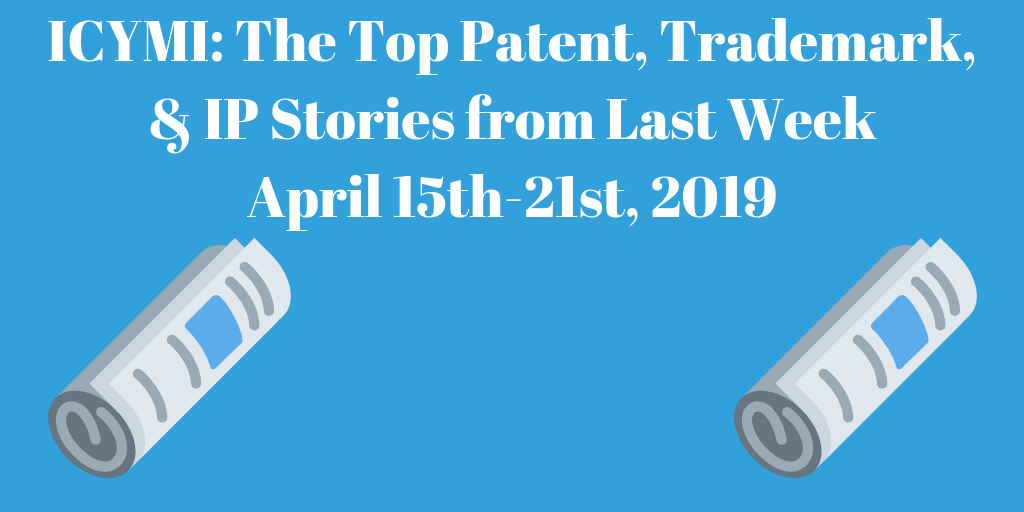Top Patent, Trademark, and IP Stories from Last Week (4/15-4/21/19)
Every week, we will be highlighting the top patent, copyright, trademark, intellectual property, etc. stories of the previous week in our “In Case You Missed It” segment. The list itself is in no particular order and includes a wide range of stories from the patent world that are informative, noteworthy, or just plain bizarre. The stories included encompass everything from Supreme Court cases to insights into growing industries. Please feel free to comment your thoughts on the stories or share an important one we missed!
1.) “Supreme Court Debates Whether FUCT Clothing Line Can Trademark Its Name”
In last week’s “In Case You Missed It,” we discussed how the Supreme Court case Iancu v. Brunetti was being heard. In this case, the USPTO is appealing a Court of Appeals for the Federal Circuit decision that ruled the Lanham Act’s prohibition on the registration of “immoral” or “scandalous” trademarks was an “unconstitutional restriction of free speech.” Erik Brunetti, owner of streetwear brand “FUCT (Friends U Can’t Trust),” was granted, then denied, his trademark application by the USPTO. He contends his free speech is being violated.
During the hearing, Deputy Solicitor General Malcolm Stewart argued the denial of the mark was not the USPTO restricting Brunetti’s free speech but rather “a valid condition on participation in a federal program.” Stewart went on to argue that Brunetti could still freely sell his clothing with the FUCT mark but the protection that comes with having a registered trademark is a “government benefit.”
Brunetti’s attorney, John Sommer, argued the “scandalous” provision of the Lanham Act should be dissolved because of how “incredibly broad” and subjective it is. What may seem okay to one person might be “immoral” or “scandalous” to another. Sommer went as far as to say that under the provision, “Steak N’ Shake” could arguably not be registered because there is a “substantial portion of Americans” who feel eating beef is immoral.
Opinions from justices were mixed during discussions. Justice Stephen Breyer argued the government should be able to have a say on what can be trademarked because they have an association with it. He also argued uplifting current law would allow for the registration of racial slurs.
Justice Sonia Sotomayor agreed, arguing that the government should have a say on what words can be registered trademarks. “Why can’t the government say, no, we’re not going to give you space on our public registry for words that we find are not acceptable?,” she argued.
Justice Elena Kagan had a different perspective, arguing the 1946 trademark law was outdated and broad.
Justice Ruth Bader Ginsburg questioned how it was determined “FUCT” was shocking in the first place. Ginsberg argues to the niche the product is being sold to, the word is “mainstream.” “If you were to take a — a composite of, say, 20-year-olds, do you think that that answer would be they would find it shocking?,” she argues.
The case will be ruled sometime in the summer. To read more about this story, click here (via Los Angeles Times, April 15th, 2019).
2.) “The Majority of the EU Just Accepted Controversial New Online Copyright Laws”
In a few “In Case You Missed It” articles I have discussed the EU’s highly controversial copyright directive. The measure will make websites liable for copyright infringements on their platforms as well force news aggregation services to obtain licenses from publishers before sharing their articles. Last month, the measure was passed by the European Parliament and on Monday, 19 of the European Council’s 28 member nations voted to make it law. Each member of the EU will now have two years to prepare and begin enforcing the law.
When the law takes effect, sites like Youtube and Facebook will be legally responsible for user copyright infringements on their platforms. Internet activists warn such potential liability will lead to content filters that will not only weed out potentially infracting content but also criticism, satire, etc.
The move will usher in a new era of copyright laws and enforcement on the internet. As Europe takes the first sweeping aim at dealing with online infringement, do not be surprised if the remainder of the world proposes similar measures over the next few years. To read more about this story, click here (via Mashable, April 15th, 2019).
3.) “Apple and Qualcomm Settle All Disputes Worldwide”
Last week, Apple and Qualcomm settled one of the most public, ugly intellectual property disputes in recent memory. The quarrel began over two years ago when Apple sued Qualcomm for anti-competitive practices, alleging the company was overcharging for its patents. Qualcomm’s patents are fundamental to mobile phone technology and have allowed them to charge royalties on nearly every phone sold.
Over time, the case turned into a brutal back-and-forth battle whereby each sued the other over issues including patent infringement, withholding evidence, exposing trade secrets, etc. The battle was on an international stage with suits filed in multiple countries, including the UK, Germany, and China. But the ugly beef came to an end, for now.
As part of their settlement, the two companies agreed to drop all litigation worldwide and enter into a six-year agreement where Apple will pay royalties to use Qualcomm patents. To read more about this story, click here (via New York Times, April 16th, 2019).
4.) “PlayStation VR Patent Wants to Put You Inside Your Pal’s Games”
New patents for the PlayStation VR headset will allow users to not only attend live eSports as if they are in attendance but also spectate a user’s gameplay from within the game itself. With the eSports industry projected to become a $1 billion industry this year, such technology would help viewers become part of the experience. The patent will allow thousands, if not millions, to view an eSports event as if they were there.

The other virtual reality patent, “Spectator View Tracking of Virtual Reality (VR) User in VR Environments,” would allow a spectator to view a user from within the game itself. The patent would allow users to observe “dynamically changing environments” the player is navigating through as well as allow the viewer a 360° view of gameplay. Viewers could be in the stands of sports games or on the sidelines of a racing game. To read more about this story, click here (via Tech Radar, April 15th, 2019)




